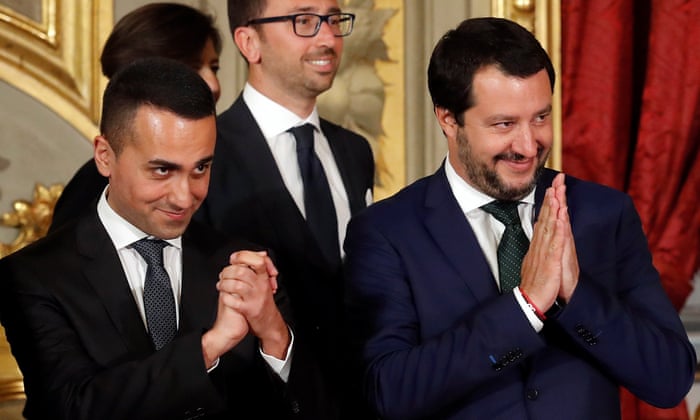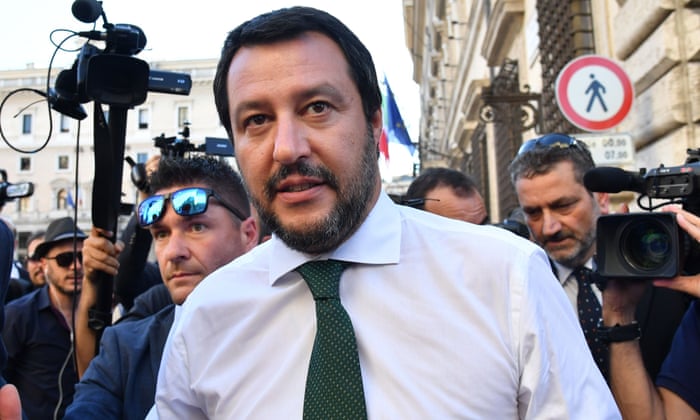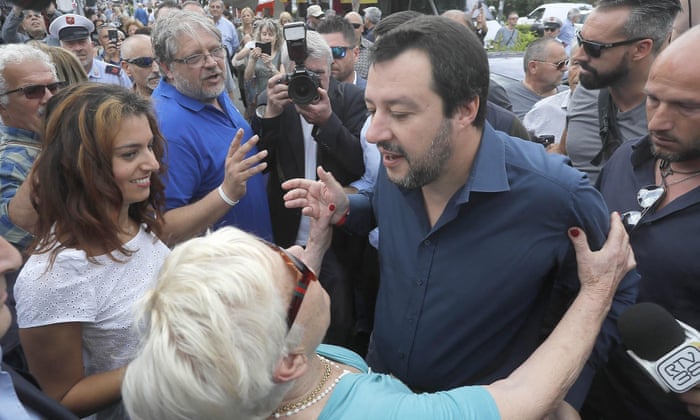Five Star and the League: can Italy’s ‘odd couple’ last?
In the country’s prosperous north, there’s firm backing for League leader Matteo Salvini

Matteo Salvini (right) after being sworn into power last week, in coalition with Luigi Di Maio (left) of the anti-establishment Five Star Movement. Photograph: Remo Casilli/Reuters
 Angela Giuffridain Pontida-
Angela Giuffridain Pontida-
To his many critics, Matteo Salvini, the leader of the far-right League, is a racist opportunist who is about to take Italy down a dangerously confrontational and xenophobic path. To his supporters, in the League’s northern heartlands, he is a “warrior” whose high-profile instalment as interior minister in western Europe’s first populist government is a symbol of the country’s much-needed pivot to the right.
That is certainly the view in Pontida, a relatively prosperous village in the northern Lombardy region’s Alpine foothills, where thousands of League supporters converge once a year for a rowdy celebration in the party’s honour.
“Salvini is a great revolutionary,” Giuseppe Paruta, a pensioner who has supported the party since its early days as a northern Italy secessionist movement, told the Observer.
“He’s one of us. When he comes to the festival each year, he makes a speech, eats with us, drinks with us. Sometimes he comes across as aggressive, but he’s not a bad person.”
Paruta is jokingly known around town as Pontida’s Donald Trump – he sports a hairstyle uncannily similar to that of the US president. “I like him too, but Salvini is better,” he said.
Much like Trump, Salvini is esteemed by Paruta and his friends at the town’s Bar8 as the strongman needed to restore law and order in a country they claim is buckling under the weight of the migrant crisis.
Salvini supporters admit they have relatively little to complain about: their pensions are good and they own their homes. But they say they resent having had to work so hard for their achievements when they see “illegal immigrants wandering around, doing nothing and not paying taxes like we had to”. They are counting on Salvini to put a stop to all of that.
After weeks of tortured negotiations, the 45-year-old Salvini was handed power over the interior ministry on Friday, when the League was sworn into government in coalition with its former rival, the anti-establishment Five Star Movement (M5S).
Salvini, born in Milan to a middle-class family, was swift to remind voters that his top priority would be to deal with thousands of illegal immigrants. “Open doors for good people and a one-way ticket for those who come to create commotion,” he said.
The government was formed despite the apparent collapse of talks when president Sergio Mattarella rejected the coalition’s nomination of controversial Paolo Savona as finance minister. The 81-year-old economist, a noted critic of the European Union, had previously called the euro a “German cage” and his appointment was judged to be beyond the pale by Mattarella.
As markets went into turmoil, insults were traded with the EU and calls were made by Luigi Di Maio, leader of M5S, for Mattarella to be impeached. But faced with the prospect of fresh elections in July, Salvini and Di Maio scrambled to put together an alternative cabinet that will now see Savona challenge the EU in the guise of European affairs minister. Meanwhile Giovanni Tria, an economics professor with a more moderate tone towards Europe, was named finance minister.
Salvini and Di Maio agreed that neither should become prime minister of the new coalition, instead appointing Giuseppe Conte, a relatively unknown law professor with no political experience, to steer a government programme that includes generous tax cuts, a universal basic income and a raft of hardline policies against illegal immigrants, Roma people and Muslims. They will, however, share the role of deputy premier, with Di Maio, a 31-year-old former waiter, also serving as minister of labour. The new coalition is expected to receive a vote of confidence this week.
But while League supporters are happy their hero has made it into government, they have reservations about the union with M5S.

Salvini, usually seen wearing jeans and open-necked shirts, is considered by his admirers as a down-to-earth man of conviction. Di Maio, on the other hand, is perceived as a sharp-suited ditherer, who is as inexperienced as he is inconsistent.
“The League is totally different from M5S,” said Giulio Sapelli, an economics professor who taught Salvini at the University of Milan. “You never know what they [M5S] are thinking or going to do. For example, this calling for Mattarella to be impeached was crazy.”
Sapelli, a eurosceptic who was among those mooted as a potential premier for the coalition, also pointed to the League’s history in government and experience in administering two of Italy’s richest regions – Lombardy and Veneto. Meanwhile, haphazard management has seen M5S lose support in the two biggest cities it runs, Rome and Turin.
“It’s very hard to know how long [this government] will last,” added Sapelli. “The League is the only classic ‘rank and file’ party left; M5S is a movement with a weird leadership.”
Marco Ghezzi, the League’s candidate for mayor in upcoming local elections in Calolziocorte, a town close to Pontida, would have preferred the party to have stuck with its centre-right coalition partners: Silvio Berlusconi’s Forza Italia and the smaller far-right Brothers of Italy. The group won the biggest share of the vote in the 4 March elections but fell 3% shy of the majority required to govern. Berlusconi stepped aside to allow the League to forge a deal with M5S, which sees the 81-year-old media magnate as a symbol of the corruption it has long railed against, although the alliance still campaigns at regional and local level.
 Matteo Salvini greets supporters of his party during a visit to a local market in Pisa last week. Photograph: Gianni Nucci/EPA
Matteo Salvini greets supporters of his party during a visit to a local market in Pisa last week. Photograph: Gianni Nucci/EPA
“The problem with M5S is that they don’t have a ‘structured party’. Most of it is based online,” said Ghezzi.
Ghezzi is expected to win the 10 June vote in Calolziocorte by a landslide, ousting a centre-left Democratic Party leadership, which in itself is an anomaly in a region dominated by the League.
At a mayoral hustings on Thursday night, the prime concern of the town’s residents was security. Its population of 15,000 includes about 1,500 foreigners. Ghezzi said most are integrated, but in recent years the area has seen an uptick in the arrival of illegal immigrants.
“They hang around the station at night, sleep in abandoned houses and by the river,” he added. “It’s a scandal for the people here, who mostly live in mountain villages and cherish their values and tradition.”
Echoing Salvini, Ghezzi said that migrants ought to be vetted before they arrive.
Salvini is notoriously quick to speak out when crimes are committed by foreigners, while remaining silent over incidents involving white-skinned Italians. In a recent Facebook post he expressed horror at the alleged gang-rape of an Italian woman by Bengali men in Rome, but failed to mention the arrests of five Italian hotel workers a few days earlier over the alleged rape of a British woman in the holiday town of Sorrento.
Ghezzi claims the reactions are different because the proportion of crimes committed by immigrants outweighs that by Italians. Italy’s crime rate has fallen 8.3% over the past decade, according to interior ministry figures, despite the number of foreigners increasing from three to five million.
“In Italy, public debate is often not based on reality, but on the perception of reality,” said Matteo Pucciarelli, a journalist at La Repubblica and author of Anatomy of a Populist: the true story of Matteo Salvini. “Crime has gone down, but the feeling of insecurity has risen. Truth doesn’t count, but what you say does, and in this respect Salvini is incredible. We don’t live in the Wild West, but he gives the impression that we do.”
Pucciarelli believes that Salvini, whom he describes as a “media animal”, will continue to project false realities while giving the impression that all is in order.
“For example, deporting thousands of immigrants is impossible. But all the same he’ll succeed in making it look as if he is a minister ruling with an iron fist.”
That is certainly the view in Pontida, a relatively prosperous village in the northern Lombardy region’s Alpine foothills, where thousands of League supporters converge once a year for a rowdy celebration in the party’s honour.
“Salvini is a great revolutionary,” Giuseppe Paruta, a pensioner who has supported the party since its early days as a northern Italy secessionist movement, told the Observer.
“He’s one of us. When he comes to the festival each year, he makes a speech, eats with us, drinks with us. Sometimes he comes across as aggressive, but he’s not a bad person.”
Paruta is jokingly known around town as Pontida’s Donald Trump – he sports a hairstyle uncannily similar to that of the US president. “I like him too, but Salvini is better,” he said.
Much like Trump, Salvini is esteemed by Paruta and his friends at the town’s Bar8 as the strongman needed to restore law and order in a country they claim is buckling under the weight of the migrant crisis.
Salvini supporters admit they have relatively little to complain about: their pensions are good and they own their homes. But they say they resent having had to work so hard for their achievements when they see “illegal immigrants wandering around, doing nothing and not paying taxes like we had to”. They are counting on Salvini to put a stop to all of that.
After weeks of tortured negotiations, the 45-year-old Salvini was handed power over the interior ministry on Friday, when the League was sworn into government in coalition with its former rival, the anti-establishment Five Star Movement (M5S).
Salvini, born in Milan to a middle-class family, was swift to remind voters that his top priority would be to deal with thousands of illegal immigrants. “Open doors for good people and a one-way ticket for those who come to create commotion,” he said.
The government was formed despite the apparent collapse of talks when president Sergio Mattarella rejected the coalition’s nomination of controversial Paolo Savona as finance minister. The 81-year-old economist, a noted critic of the European Union, had previously called the euro a “German cage” and his appointment was judged to be beyond the pale by Mattarella.
As markets went into turmoil, insults were traded with the EU and calls were made by Luigi Di Maio, leader of M5S, for Mattarella to be impeached. But faced with the prospect of fresh elections in July, Salvini and Di Maio scrambled to put together an alternative cabinet that will now see Savona challenge the EU in the guise of European affairs minister. Meanwhile Giovanni Tria, an economics professor with a more moderate tone towards Europe, was named finance minister.
Salvini and Di Maio agreed that neither should become prime minister of the new coalition, instead appointing Giuseppe Conte, a relatively unknown law professor with no political experience, to steer a government programme that includes generous tax cuts, a universal basic income and a raft of hardline policies against illegal immigrants, Roma people and Muslims. They will, however, share the role of deputy premier, with Di Maio, a 31-year-old former waiter, also serving as minister of labour. The new coalition is expected to receive a vote of confidence this week.
But while League supporters are happy their hero has made it into government, they have reservations about the union with M5S.

Salvini, usually seen wearing jeans and open-necked shirts, is considered by his admirers as a down-to-earth man of conviction. Di Maio, on the other hand, is perceived as a sharp-suited ditherer, who is as inexperienced as he is inconsistent.
“The League is totally different from M5S,” said Giulio Sapelli, an economics professor who taught Salvini at the University of Milan. “You never know what they [M5S] are thinking or going to do. For example, this calling for Mattarella to be impeached was crazy.”
Sapelli, a eurosceptic who was among those mooted as a potential premier for the coalition, also pointed to the League’s history in government and experience in administering two of Italy’s richest regions – Lombardy and Veneto. Meanwhile, haphazard management has seen M5S lose support in the two biggest cities it runs, Rome and Turin.
“It’s very hard to know how long [this government] will last,” added Sapelli. “The League is the only classic ‘rank and file’ party left; M5S is a movement with a weird leadership.”
Marco Ghezzi, the League’s candidate for mayor in upcoming local elections in Calolziocorte, a town close to Pontida, would have preferred the party to have stuck with its centre-right coalition partners: Silvio Berlusconi’s Forza Italia and the smaller far-right Brothers of Italy. The group won the biggest share of the vote in the 4 March elections but fell 3% shy of the majority required to govern. Berlusconi stepped aside to allow the League to forge a deal with M5S, which sees the 81-year-old media magnate as a symbol of the corruption it has long railed against, although the alliance still campaigns at regional and local level.
 Matteo Salvini greets supporters of his party during a visit to a local market in Pisa last week. Photograph: Gianni Nucci/EPA
Matteo Salvini greets supporters of his party during a visit to a local market in Pisa last week. Photograph: Gianni Nucci/EPA“The problem with M5S is that they don’t have a ‘structured party’. Most of it is based online,” said Ghezzi.
Ghezzi is expected to win the 10 June vote in Calolziocorte by a landslide, ousting a centre-left Democratic Party leadership, which in itself is an anomaly in a region dominated by the League.
At a mayoral hustings on Thursday night, the prime concern of the town’s residents was security. Its population of 15,000 includes about 1,500 foreigners. Ghezzi said most are integrated, but in recent years the area has seen an uptick in the arrival of illegal immigrants.
“They hang around the station at night, sleep in abandoned houses and by the river,” he added. “It’s a scandal for the people here, who mostly live in mountain villages and cherish their values and tradition.”
Echoing Salvini, Ghezzi said that migrants ought to be vetted before they arrive.
Salvini is notoriously quick to speak out when crimes are committed by foreigners, while remaining silent over incidents involving white-skinned Italians. In a recent Facebook post he expressed horror at the alleged gang-rape of an Italian woman by Bengali men in Rome, but failed to mention the arrests of five Italian hotel workers a few days earlier over the alleged rape of a British woman in the holiday town of Sorrento.
Ghezzi claims the reactions are different because the proportion of crimes committed by immigrants outweighs that by Italians. Italy’s crime rate has fallen 8.3% over the past decade, according to interior ministry figures, despite the number of foreigners increasing from three to five million.
“In Italy, public debate is often not based on reality, but on the perception of reality,” said Matteo Pucciarelli, a journalist at La Repubblica and author of Anatomy of a Populist: the true story of Matteo Salvini. “Crime has gone down, but the feeling of insecurity has risen. Truth doesn’t count, but what you say does, and in this respect Salvini is incredible. We don’t live in the Wild West, but he gives the impression that we do.”
Pucciarelli believes that Salvini, whom he describes as a “media animal”, will continue to project false realities while giving the impression that all is in order.
“For example, deporting thousands of immigrants is impossible. But all the same he’ll succeed in making it look as if he is a minister ruling with an iron fist.”
